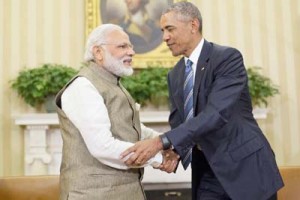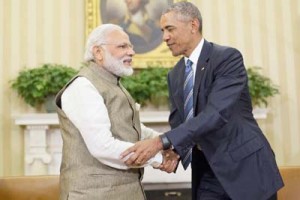Wall Street Journal
SADANAND DHUME
 Prime Minister Narendra Modi’s three-day visit to Washington last week brought India closer to the U.S. than ever before. For the country that invented nonalignment, this willingness to engage Washington without fear or apology signals a new self-confidence.
Prime Minister Narendra Modi’s three-day visit to Washington last week brought India closer to the U.S. than ever before. For the country that invented nonalignment, this willingness to engage Washington without fear or apology signals a new self-confidence.
Since coming to power two years ago, Mr. Modi has made it clear that a close relationship with the U.S. lies at the heart of expanding India’s economy, upgrading its technology and modernizing its military. In 24 months, he has met with President Barack Obama seven times, visited the U.S. four times, and hosted Mr. Obama as the chief guest at India’s annual Republic Day parade, making him the first U.S. president to be given that honor.
In Washington, the two leaders released a 50-point joint statement that listed bilateral cooperation on climate change, civil nuclear commerce and counterterrorism, among other areas. After many years of negotiation, India and the U.S. agreed to sign a logistics agreement that will make it easier for their militaries to share bases. In his address to a joint meeting of Congress, Mr. Modi applauded “the great sacrifices” of U.S. soldiers in the “service of mankind.” Legislators gave the prime minister nine standing ovations.
The consequences of growing warmth between the world’s most powerful country and its largest democracy will be felt across Asia. For close American allies such as Australia, Japan and South Korea, it signals Washington’s blessings for their own deepening ties with New Delhi.
For many Southeast Asian countries, it suggests U.S. commitment to the region and a democratic entente to ensure that authoritarian China does not muscle its way to regional hegemony. Days after Mr. Modi departed Washington, American, Indian and Japanese navies began annual trilateral exercises near the South China Sea.
Mr. Modi’s embrace of the U.S. owes more to his shrewd calculation of India’s national interest than to his personal bond with Mr. Obama, which Indian media love to hype.
Since the end of the Cold War and India’s economic opening in 1991, India and the U.S. have drawn closer to each other. Both are loath to pick a fight with China, but neither wants to see it dominate Asia unchallenged. India’s promising economy, the third-largest in Asia, and shared concerns about radical Islam have further cemented ties.
In theory the idea of closer U.S.-India ties enjoys broad political support in India, but Mr. Modi has set a faster pace than his predecessors did. Having India’s first single-party majority in the lower house of Parliament since 1989 gives Mr. Modi more room to maneuver. As a leader of the right-of-center Bharatiya Janata Party, Mr. Modi need not pay lip service to India’s first prime minister, Jawaharlal Nehru, or his legacy of nonalignment.
Mr. Modi’s strong nationalist credentials make him largely immune to the usual charges by America-bashers, who tend to measure India’s sovereignty by its distance from Washington. Nor does it hurt that Mr. Modi draws little support from the two constituencies in India most opposed to America—communists and Islamists.
Freed from these constraints, Mr. Modi has staked out a remarkably energetic and pragmatic foreign policy. India has moved toward helping solve climate change even if it did not create the problem. Mr. Modi and Defense Minister Manohar Parrikar have also bolstered military cooperation with the U.S. and ended eight years of foot-dragging under former Defense Minister A.K. Antony. While New Delhi seeks better relations with China, it no longer appears willing to give Beijing a tacit veto over its defense relations with other countries.
To be sure, it’s too early to say if India’s strategic tilt toward the U.S. will last. Left-leaning pundits have greeted it with alarm, playing to India’s old fears of being seen as a vassal.
Nor are economic ties keeping pace with strategic ties. India and the U.S. are no closer to signing a bilateral investment treaty than they were two years ago.
Washington continues to prevaricate over backing India’s bid to join the 21-member Asia-Pacific Economic Cooperation forum. Mr. Modi’s cautious approach to economic reforms raises questions about whether his domestic policies can supply the economic heft needed to fulfill his strategic ambitions.
Washington can be clumsy too. Earlier this year, Congress had to step in to derail a proposal to gift Pakistan eight F-16 fighter jets.
For now, the U.S. and India are closer to each other than ever before. Should the honeymoon last, historians may look back at Mr. Modi’s term as a pivotal moment in Asia’s post-Cold War history.




